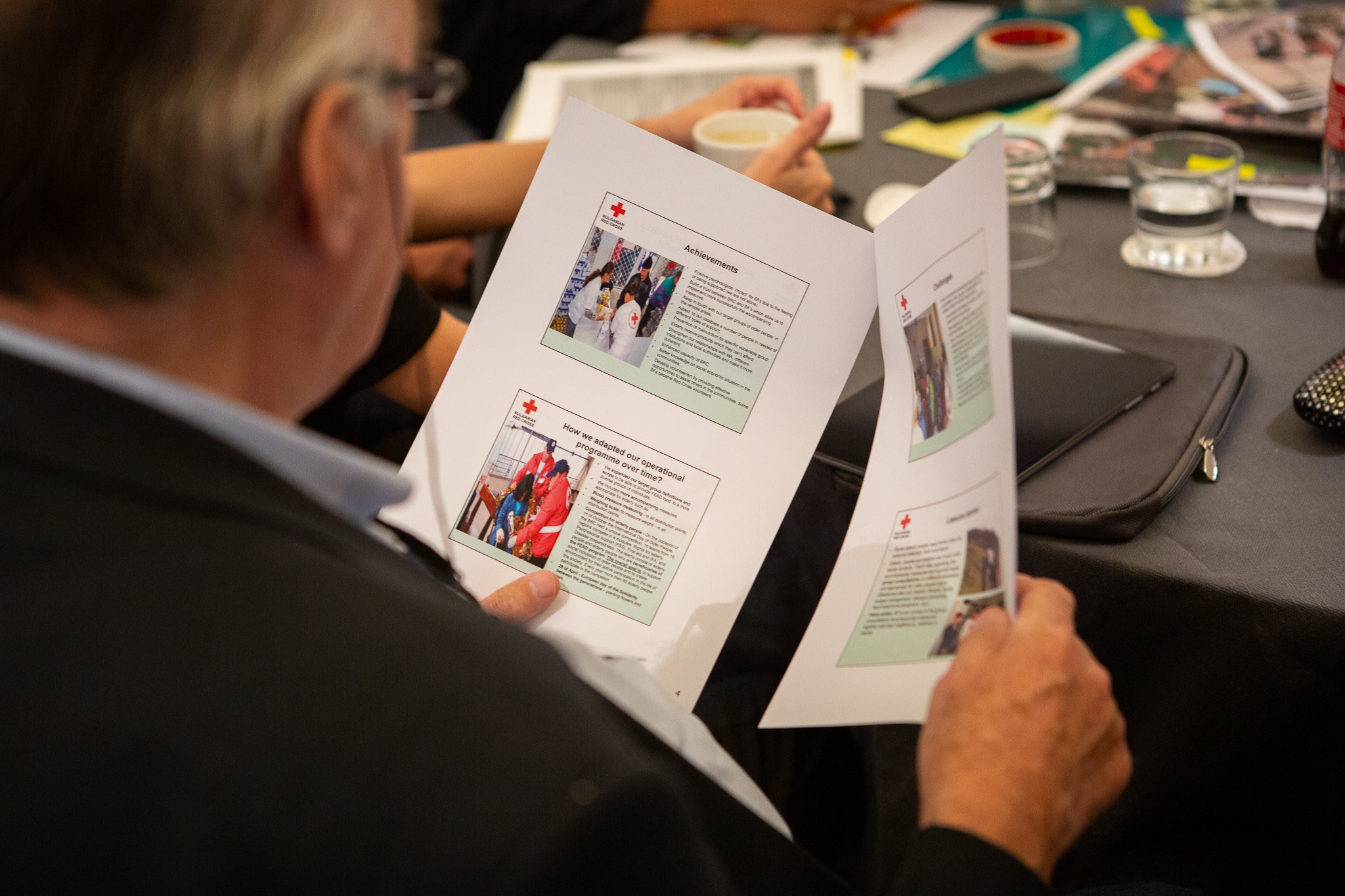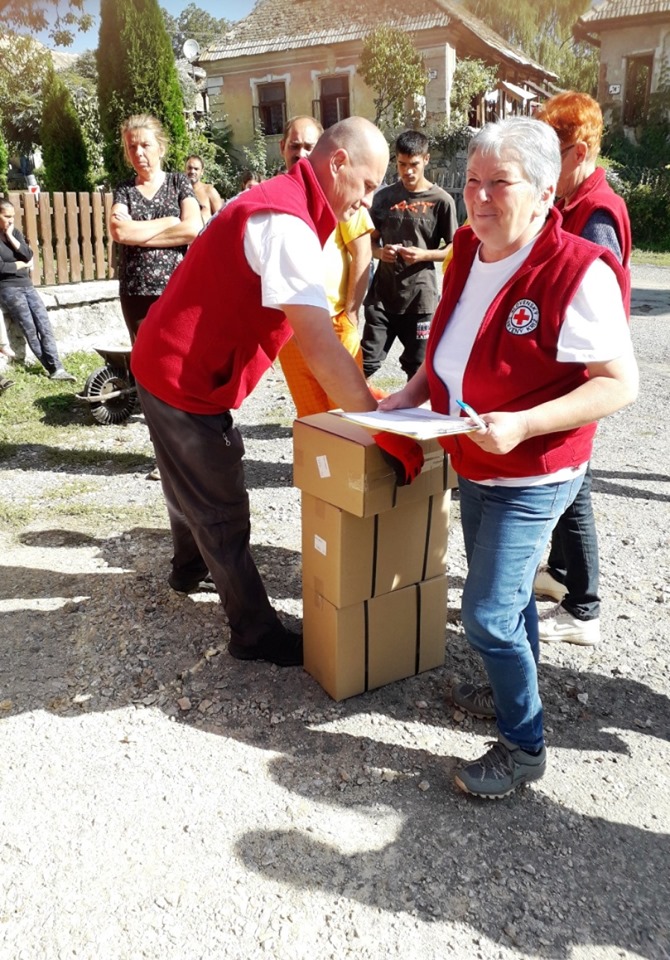EU aid: Lessons learned from 5 years of FEAD
Taking stock and assessing achievements – this was the mission for 110 attendees of the European network meeting “Celebrating Five Years of the Fund for European Aid to the Most Deprived (FEAD)”, which took place in Brussels on 20 September 2019.
FEAD was introduced in 2014 as an EU action to alleviate the worst forms of poverty and foster social cohesion in Europe. One in four EU residents lives at risk of poverty and social exclusion, one in ten faces material deprivation. The picture shows a feminisation of poverty. Children, older people, and homeless or roofless people are also at higher risk.
Do public authorities and partner organisations succeed in reaching out to those who really need support? Does the FEAD programme achieve positive change?

Delegates from across Europe considered these questions and exchanged ideas on how to improve work in this area for the years to come. Red Cross experts from Bulgaria, Croatia, Hungary, Italy, Slovakia, and Spain contributed to discussions with insights from programme management at national level and last-mile engagement in local communities. Participants were invited to examine FEAD practices from six different countries and to visits three local FEAD projects in Brussels, including the Saint-Vincent de Paul Society, which provides support and material assistance to destitute people, regardless of their race or religion. Support is offered in the form of “Aiding” including moral support and accompaniment, “Feeding” with particular attention paid to balanced nutrition for families in need, “Clothing” including second hand clothes and access to washing machines, and “Housing”, with a focus on temporary accommodation for homeless families.
“I have participated in a few FEAD Network meetings until now. Even though we all have the same mission – to use FEAD to help those in need, at each meeting we hear, see and learn something new. This is certainly an inspiration for our future FEAD projects!”, shared Adela Sočev, director of the Red Cross city branch in Koprivnica, Croatia. “I am particularly delighted to have discovered the Saint-Vincent de Paul Society. We had the opportunity to see and speak to their enthusiatic volunteers, and I like fact the malls in Belgium are knowledgeable and regularly donate food before the expiry date”, she added.
During the meeting, Spanish Red Cross representatives shared data from a survey carried out among recipients of EU aid and assistance. Approximately 1.6 million people in Spain live with some form of food deprivation. Many among them are long-term unemployed people, working-poor, vulnerable older people, dependent children, or migrants. Women constitute the largest recipient group; especially women heading monoparental families and survivors of gender-based violence. A lack of resources and social protection, a difficult housing situation, health problems and the absence of support networks are all frequent factors. Acceptance and appreciation for the Red Cross’ assistance is high. But it takes more than the occasional food basket to make a real difference.
Speakers form the Bulgarian Red Cross shared insights into the organisation of food distribution through a nationwide network of 300 local delivery points. This network manages to serve up to 330,000 people in need of assistance each year, among them many older people. Again, a clear lesson was that meaningful assistance involves going beyond food aid to provide other kinds of support. Many older Bulgarians live in isolation and feel lonely. Gatherings in Red Cross branches or volunteers bringing goods directly to people’s homes open doors to more regular interactions, as well as to the possibility of participate in social activities, or seeking advice and counselling. For people receiving aid and assistance company can be a lifesaver.

© Patricia Madajová
In countries like Bulgaria or Spain, setting up national support programmes is a large-scale operation that requires considerable numbers of well trained and organised volunteers, who are able to balance operating complex logistics, with serving every single person in need with attention, dedication, and respect. Continuous adaptation of the aid on offer is equally important.
In Ireland, state authorities looked into improving the type of assistance given to vulnerable families. Following a pilot project with a local NGO, the Irish FEAD programme rolled out a distribution scheme for school stationary kits. The kits were distributed to children in families receiving food assistance and families with applicants for international protection. So far, 90,000 children received age adapted kits containing backpacks, pencils, markers, rulers, writing books and more.
School material for children, food assistance, advice and social activities for the elderly – these are best-practice examples that illustrate how EU aid fund resources can be adapted to the specific needs of particularly vulnerable groups of dependent persons. Five years of implementation in 28 countries underlines that a “one size fits all” approach does not work for people living with deprivation. For FEAD, flexibility and adaptability are key.
“We welcome the European Commission’s proposal at the conference to increase the participation of end recipients in the networking activities at European level”, said Maria Jesús Gil Meneses, FEAD coordinator at the Spanish Red Cross. “In addition, the network should advocate a stronger role for civil society organisations in the upcoming European Social Fund plus, including programming, delivery and evaluation.”
The Fund for European Aid to the Most Deprived is the EU programme dedicated to aid and support to the most vulnerable groups in society. The FEAD Network gathers civil society organisations, FEAD managing authorities, and other organisations involved in providing assistance to some of the most vulnerable people in Europe. Several National Red Cross Societies participate in the network and regularly contribute their experience and expertise to the meetings.
For media inquiries, please contact Eva Oyón on: eva.oyon@redcross.eu or +32 2 235 09 22

